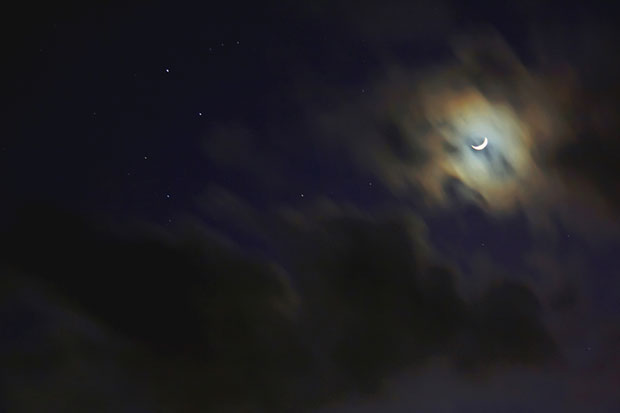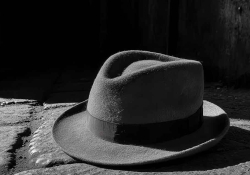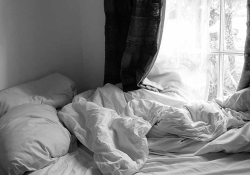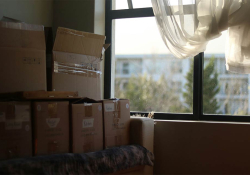Coming
Set in an old house in provincial East Germany, “Coming” begins with a boy’s memories of the ghastly suicidal wails of the women who lived in his neighborhood. Trying to escape these painful cries, he sneaks out during the summer nights and crawls out upon a tongue of land jutting into a nearby lake. On one such outing, an uncanny experience changes him forever.

It’s as though all through childhood my ears rang from the cries of the women. For a long time I failed to hear them; only later did they reach me distinctly, rising far away, faint, then louder and louder, as through a warren of alleys down which I gradually approached the one street completely filled by them, as by strident songs, a ghastly composition . . . In my dreams I approach this disharmony of cries; they swell, and when I’m in their midst, when I hear them from all sides, I start up from my sleep; alarmed, I strain my ears into the night, which though utterly still I know holds a cry, inaudible only by chance.
The cries ring out through my memory of the years when I was ten or twelve, when I had given up all hegemonic claims within the family and ceased to respond to the cries of the women. Only now did I guess the exact words they spoke, did I think I understood when they gasped out the seeming non sequitur: The lake! The lake! I’m going to throw myself into the lake!
And often it seemed to sound like: We’re going to throw ourselves into the lake! — But that couldn’t be; the term we, in this random lot of people cooped up in a tiny flat and forced into a group, had fallen completely out of use.
All women uttered this threat, at every opportunity that arose, it was the most devastating declaration of a ruptured, ever-unraveling communal life; these were words that could come only from the women, whose numbers in the house were incontestably superior: for one of us there were three, sometimes four of them, counting all who fluttered in and out our doors, and the worst thing that could happen was when they sought to unite their voices in a chorus, though they failed, all screaming over one another. — The lake! they screamed. I’m going to throw myself into the lake! I’ll throw myself into the lake right this minute! You had to take it with a grain of salt.
These threats were always preceded by muffled sobs—then you still had time to flee—and in the end the words were underlined by loud weeping, quite unmusical, swelling all the louder the longer one delayed one’s disappearance. Grandmother, Mother, all the aunts sashaying about our flat, the presumably divorced sisters-in-law who sought refuge with us, the female friends from the neighborhood, all made abundant use of this weapon, and the cousins, too, and at last, or so it seemed, even some of my female acquaintances when they dropped by, which astonished me. They had come solely to lend support to the women of the family, I thought, when I saw that I immediately forfeited their sympathy, that they chimed in with the others’ woeful wails if I left the room even for a moment . . . What pained them so was my apathy, which I took almost to the point of invisibility: I hunched speechless in some seat in the flat’s periphery, and my contours grew fainter and fainter.
Though the first cause of these cries was Grandfather’s smoking and drinking, soon that seemed forgotten, and they focused all their vocal force on me. The occasions were arbitrary: my silence was as good as my speech; I heard the cutting words whenever I lied or stole money, when I brought home bad grades, when it came out that I’d cut school, roaming the rubbish dumps outside town or near the lakes in the woods . . . but most of all when, muddy and matted, I came home an hour before midnight, and when I seemed kindled by filthy secrets, burning all the way to my hair’s sticky ends, and all the more when I didn’t come at all; everything was cause enough for the threat: The lake . . . I’m going to throw myself into the lake!
Come now . . . am I your darling? Come on, tell me! one of the aunts urged, purring, as she oversaw my bedtime washing ritual. — No, I replied coldly, and immediately sensed the sobs rise in her throat; in a moment it would end in the cries I knew so well. — What’s he done this time, the little bugger! my grandmother’s voice rang out from the next room. He’ll send me into the lake yet, that golden boy of yours! — Those last words were directed at my mother, who defended herself, weeping: No, it’s me . . . it’s me he’s going to send into the lake! I’m going to throw myself in, oh yes I am! Dear God, he’s just never there when you need him, and it’s not like you’re asking too much of him! He just never comes when you tell him. And I’m constantly telling him! He’s making me miserable, driving me to despair. Every time I tell him: come . . . come home by six p.m. or, fine, by seven, that’s when he doesn’t come. No, no, I’ll throw myself into the lake yet!
When I lay in bed — secretly reading, under the covers with a flashlight, pulp novels my mother termed smut that would only incite me to brutality and wickedness —I was really only waiting for the flat to quiet down so that I could sneak outside. Silently I shut the doors behind me, groped down the dark stairwell, and opened the rough wooden door to the yard leading to the street with a duplicate key I’d filed to shape myself and hidden in the crack of my mattress. The key was my true secret, and I hid it with a certain pride, having produced it from directions I’d found in my pulp novels.
But my flight might also be noticed immediately, and through the second-story windows, open to the summer night, the sirens of their screams burst out onto the street so fiercely that the neighborhood dogs began to bark. — He’s off again . . . like a thief, like a criminal! He gets it from that wretched trash he reads. Oh, he’ll be the death of me yet, oh, he never listens to me . . . one of these days I’m going to throw myself into the lake! — Come, come, we’ve got to look for him, came the reply; but they never followed me, for Grandfather would intervene, slamming his fist on the table: Quiet! He’ll come back sure enough . . .
But in my mind’s eye they searched the entire flat for me, as though I might still be hidden somewhere. They searched the closets, under the beds, and in the toilet cubicle . . . they must have read too many trashy novels themselves. And their stirred-up scolding rang out onto the street, above me, before me, and behind me; I was at the center of a musical piece in which all instruments were aimed at me. But I didn’t hear it; I’d developed a form of deafness, a mystery even to myself, which I rarely neglected to make use of. When I switched it off now and then to verify that the world still existed, I heard the voices of the women, waging their war against the summer in the street: He doesn’t hear, no, he simply doesn’t hear . . . oh, I could just throw myself into the lake! And their voices made the sickle moon tremble, thin as a thread, a symbol of remote, unearthly elegance floating in the east above the black woods.
Here you could learn unbeing through sheer being, here you could wait out the night.
As by day, my nightly path took me to a small peninsula that jutted omega-shaped into a secluded forest lake. The narrow causeway leading out to the head of the formation—a dam that regularly vanished, inundated, in the spring; only a line of copses rose from the water to show where it lay, and the reed-edged circle of marsh in the middle of the lake was a true island—this path leading out was so densely flanked by brush and birch saplings that you vanished from sight the moment you set foot on it. At night the gleaming birch leaves caught the moonlight, and when they stirred in a breeze, a flutter or flicker passed down the edge of the causeway, an iridescent glitter like crinkled tinfoil, coming from beyond, from the rubbish heaps that loomed nearby forbiddingly with the blood-red light of fires, hellfires, shooting up between them: the red luminescence and the moon’s silver dazzle were echoed in the ripples of the bay, shifting out and back again, until the glimmer was swallowed by a cloud’s shadow-flight . . . and the shadow-form groping its way through birch thickets out onto the lake had not failed to note the cloud. Directly above the circular island, straight up from the head of the omega, the cloud stopped, so it seemed, to cast down its darkness: the sharp shadow of the cloud beneath the moon fell upon the marshy isle and shrouded it completely; the inner circle of the reed girdle immediately went dark . . . blotted out, lightless beneath the cloud, a place of utter invisibility: here you could learn unbeing through sheer being, here you could wait out the night. It was virtually shut out, the night that lay upon the lake, resting and yet restlessly at work, perpetually processing secrets like a ruminant beast; there was always some stir in the tall impenetrable reeds that girded the peninsula: a constant moan and sigh in the growing of the reeds, as though night sought an answer there . . . some word from the invisible things that kept hidden in the dark.
No! I said. No, they could be glad if I came back before dawn, if they found me in bed in the morning. They could be content if I held my tongue in the face of their remonstrances. If I made no comment, positive or negative, on their suspicion that I’d been gone all night; they could be happy if my reaction to their reproaches—my renewed disappearance—was possible only once the day was done, when they themselves might already be sleeping. Earlier, when I was just eight or ten, I’d known how to confront them, I’d raised my own voice, screaming too: I’m not coming, no, no! I’ll never come . . . not back here! I won’t stay, I don’t want to, I don’t have to, I don’t want to have to anymore!—And their reply was the shrieked-out announcement that they’d throw themselves into the lake. It had its effect, I fled, I escaped out to the rubbish dumps, to the lake, and again and again my path led across to the peninsula, by sun or by rain; even when I heard their voices grow fainter, more broken, spoken half to the floor, toward some pale specter crouched in a forlorn corner; they called to me so voicelessly that I could forego protest.
I continued to seek the stillness I found on the peninsula: perhaps they murmured on when I was out there, perhaps the words rose quite unthinking from their lips, like the barely visible thread of smoke that falls from a snuffed candle’s wick.
Yet I continued to seek the stillness I found on the peninsula: perhaps they murmured on when I was out there, perhaps the words rose quite unthinking from their lips, like the barely visible thread of smoke that falls from a snuffed candle’s wick. Or only they themselves now heard what they had once said, like an incomprehensible echo, resounding back from the dungeon of the last years, and they themselves could no longer understand their own words.
For me, however, their cries were always present, ushering me and goading me on; they’d lodged in my ear, perhaps forever, intolerable music, either hastening or choking my breath. At night they could be heard from afar—as though the neighbors’ sons were beating their wives—and from town the moaning drew an arc through the sky; I huddled behind the reeds and watched the wisps of mist drifting over the lake, and they too seemed to listen; I thought I saw a glimmering white, flimsy form among them, pausing on a boat washed by the black waves . . . a form that held intently still, as though the half-faded lament strove forth from my brain, its locus, to entrust itself to the ears of the mist—they reared up straight so as not to miss what lay behind the sound of the waves splashing into the reeds. — And suddenly I recalled a great mud hole, right in the center of the island, where we had sunned ourselves as children.
I recalled the sinful sense of well-being that came over me when I stripped off my clothes to stretch out in the thick black mud that filled the bottom of the hollow. It was a grainy slurry of coal slack and sand in burnt-smelling water, whose surface, when smooth, showed yellow striations of sulfur. In this puddle I lay every afternoon of the endless summer, when the mud was very warm, sometimes almost hot; the oblong hole held the whole of my body, I ceased to move and waited until at last stillness came over me. Eyes nearly shut, I stared up into a sky whose rim was ablaze, and where the sun, straight above me, was an indistinct circle of white heat from which, now and then, a drop seemed to fall . . . and a yellow cloud, nearly white, seemed to draw near this sun, touching the edge of its glaring gorge and beginning to melt.
Raindrops fell, a steaming yellow rain from the sun-hot sky, moisture that burned in the eyes. The sun-rain increased, the liquid in the mud puddle rose, the slurry that penetrated all my folds, all my pores, closed smoothly over my thighs; it rained harder, seething floods poured from a sky almost fully blue, the mud rose higher, hot and sucking it closed over my protruding sex, crept oppressively up my belly and my chest, and I waited tensely for it to reach my neck; already my arms were firmly embedded in the tenacious black tide that forced its relentless way up to my armpits, pressing my shoulders to the bottom, so that I seemed to merge inseparably with the peaty soil. Already I felt a terrifying tickle beneath my chin, and sensed my hair growing into the swamp below me, as though to root my body in the earth. And I seemed to have utterly dissolved in a black heat, the light of the sky still blinding me behind closed lids, as the rain splashed in the mud on my chest and boiled all about on the water of the lake, as dried stubs of plants softened and began to steam foully, as the rain crackled and rustled in the reeds as though to break them down or erect them . . . and under the weight of the seething vapors all around something shot out from my body, something like a dull pain, something hard within me that had dissolved and turned liquid, departing me with monstrous ease, only my loins had flared and faded once more, only a brief rearing and stretching of my trapped spine, and I was still again, suddenly soft and unfeeling, nothing now but rot and water, indistinguishable from the elements around me and above me with which I had mingled myself.
In that moment the shrill song in my ears broke off. From then on the scolding and the threats fell still; there was a silence within me, as though the cries wished to be mere memory; gradually I began to forget them. — Into the lake . . . into the lake, the women’s venting utterance seemed suddenly to have gone mute. And at once I began to miss it; a moment later I felt that, from this time on, I would have to seek the voices of the women.
In secret I eyed their closed mouths, which seemed pinched and gray, oddly blurred and colorless; they wasted no more words on my unseemly behavior: on my coming too late, not coming at all . . . oh, my coming had ceased to matter to them. And so they no longer promised to go, go throw themselves into the lake . . . they ceased to threaten me with it, and stayed where they were. There was a dully flowing, yellow-green veil between us, made of rain, made of mist, and all words and retorts were lost in it. We no longer reached the surface; a chill prevailed between us, inevitably seeping inside if we offered even the tiniest opening.
It was pointless now to avow how I loved them, pointless to concede what they had once extorted, the irrefutable proof of my love, the liquid proof of my love that would encompass them all . . . and that I no longer had the strength to mobilize in myself.
It was pointless now to avow how I loved them, pointless to concede what they had once extorted, the irrefutable proof of my love, the liquid proof of my love that would encompass them all . . . and that I no longer had the strength to mobilize in myself. In all the years that had sunk from my reach I had sought to hoard the names of love within me, a river of names, a deluge of words, a swell of endearments frothing and mounting . . . I couldn’t find them, or the words failed to find me. They, the women they were meant for, were too old for them, I had missed the right moment. The names of love had bailed out somewhere, crossed over to an unknown shore, they were on the far edge of a bleak river, out of my reach, scattered and barren like dim stars above my smoking nights.
But one last time I resolved to follow them: the words of the women, or my words, or their silence, or mine. I set out in search of what seemed lost to me. Again I left the house in the middle of the night and wandered for a long time, breathing heavily I strayed through the liquid moonlight: I recalled the mud hole from my childhood . . . Perhaps it was there, I thought, that I lost everything! — I hastened through woods where wafts of mist fooled my eyes, like nightgowns fleeing, then over an open field, across the endless rubbish heaps where the empty bottles and flickering snakes of tinfoil echoed the unearthly gleam of the sickle moon, and where deep in the night came a dark red glow as from subterranean fires. At last I found the peninsula, the omega: already I saw myself from afar, running across amid the thickets to the center of the island . . . the birches had grown tall, the underbrush thin, but the trees were bare, they had died and rotted, their crumbling trunks soaked with water. I reached the shore and saw the lake stretched between the dark ruined trees, the causeway lay under water; it was impossible now to cross to the island, looming from the waves before the fiery glow like the fragment of a skull whose hair stood on end. And at a distance drifted clumps of foam—or were they clots of fog?—some of them erect, twisting upward like rising spirals, or like ghosts circling the island in wobbling boats . . .
Not yet, ferryman, I said. I’m not ready to board your boat. Cast off once more without me, old friend; I must find my way back first. I must know those names first, that myriad of names . . . then I’ll follow you.
For one day I will find them . . . and then, to show you all, I’ll hurl it after you, my love, and the names for it, and the thoughts I have. — Into the lake! The lake! I cried, and, inflamed by a dull bolt of lightning in my body, I stepped close to the shore, where I tore my trousers open. Panting I began to empty myself, as though to form a bond between myself and the earth, I pissed steaming into the water, painfully I poured myself and emptied myself utterly into the dark water on which the swelling white gowns floated.
Translation from the German
By Isabel Fargo Cole
Editorial note: From The Sleep of the Righteous, forthcoming in October 2015 from Two Lines Press.















